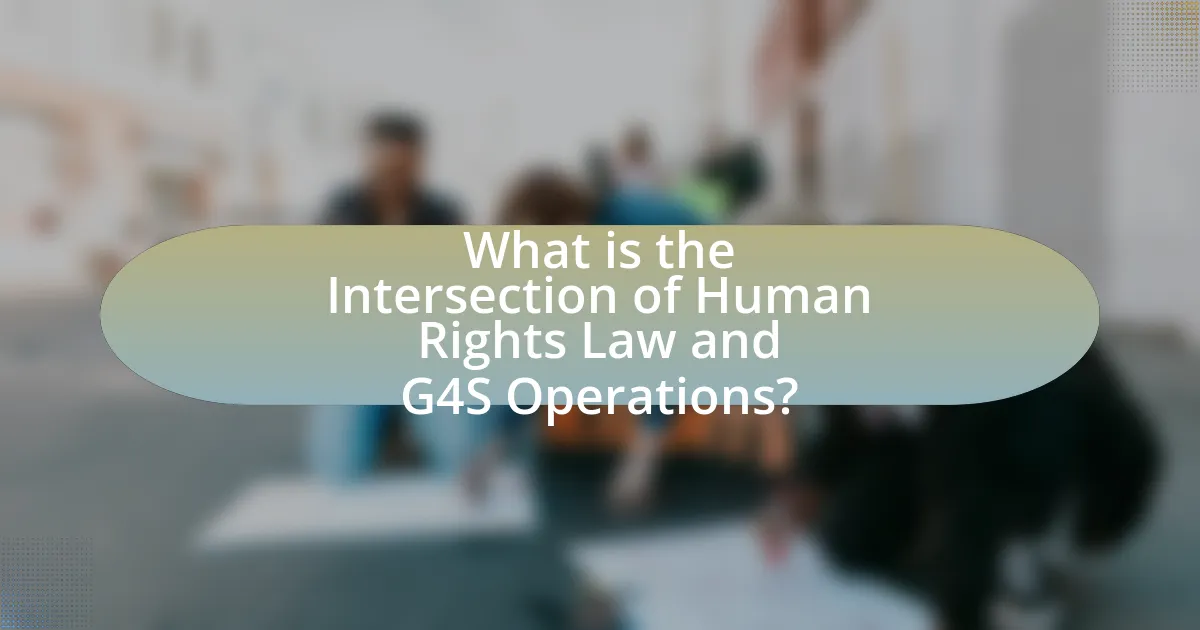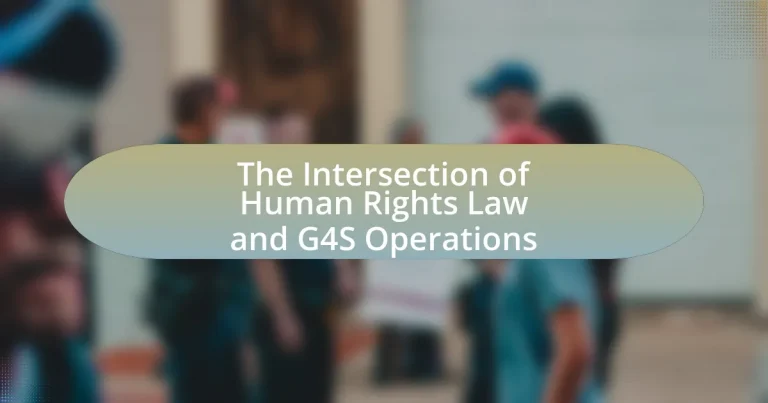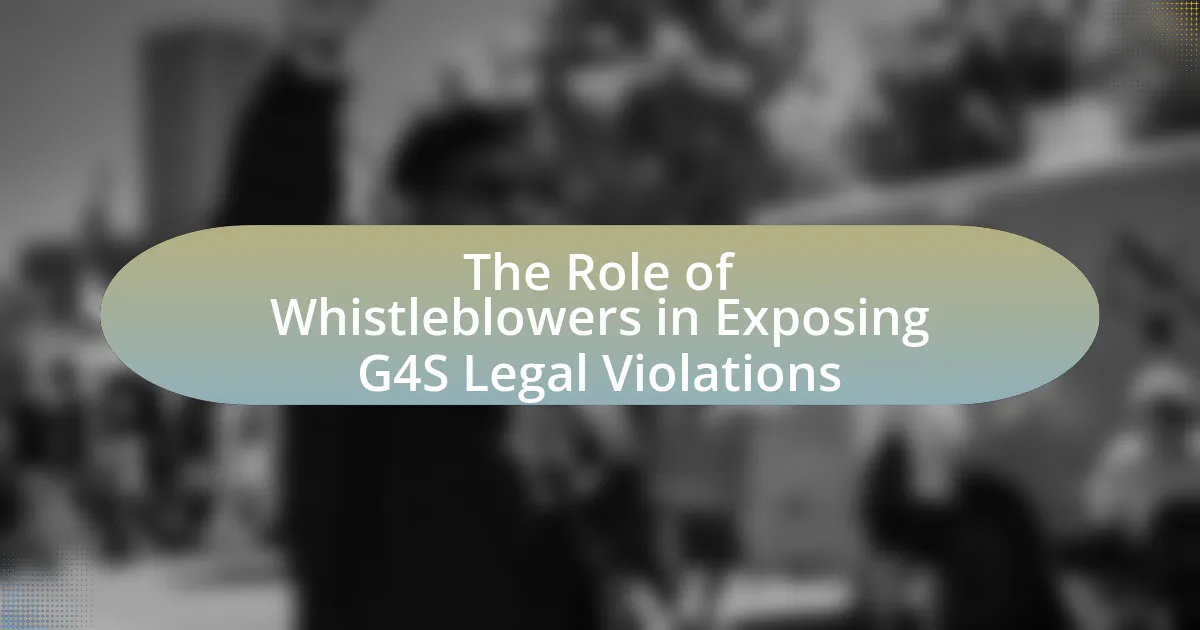The article examines the intersection of human rights law and the operations of G4S, a leading global security provider. It outlines G4S’s obligations to uphold human rights standards, particularly in high-risk environments such as conflict zones and immigration detention facilities. Key human rights principles relevant to G4S operations include the right to life, prohibition of torture, and non-discrimination. The article also discusses the challenges G4S faces in adhering to these laws, the criticisms it has received regarding human rights violations, and the measures it has implemented to address these issues, including stakeholder engagement and compliance frameworks. Additionally, it highlights the potential impacts of G4S’s operations on global human rights standards and the importance of transparency and accountability in its practices.

What is the Intersection of Human Rights Law and G4S Operations?
The intersection of human rights law and G4S operations involves the company’s responsibility to uphold human rights standards in its security services. G4S, as a global security provider, is subject to various human rights obligations, including the United Nations Guiding Principles on Business and Human Rights, which mandate that businesses respect human rights and avoid complicity in human rights abuses. For instance, G4S has faced scrutiny and criticism for its involvement in security operations in conflict zones, where allegations of human rights violations have emerged, highlighting the need for compliance with international human rights standards.
How do G4S operations relate to human rights law?
G4S operations relate to human rights law through their involvement in security services that can impact the rights of individuals, particularly in contexts such as immigration detention and conflict zones. The company has faced scrutiny and legal challenges regarding allegations of human rights violations, including excessive use of force and inadequate treatment of detainees. For instance, reports from organizations like Amnesty International and Human Rights Watch have documented instances where G4S’s practices may contravene international human rights standards, such as the UN Convention Against Torture. These concerns highlight the necessity for G4S to align its operations with human rights obligations to mitigate risks of complicity in abuses and ensure compliance with legal frameworks.
What are the key human rights principles relevant to G4S operations?
The key human rights principles relevant to G4S operations include the right to life, the prohibition of torture and inhumane treatment, the right to privacy, and the right to non-discrimination. These principles are foundational in ensuring that security operations respect individual dignity and freedoms. For instance, the right to life mandates that G4S must avoid actions that could lead to unlawful killings, while the prohibition of torture requires adherence to humane treatment standards for individuals in custody. Additionally, the right to privacy necessitates that G4S operations do not infringe upon personal privacy without legal justification, and the principle of non-discrimination ensures that all individuals are treated equally, regardless of their background. These principles are enshrined in international human rights treaties, such as the Universal Declaration of Human Rights and the International Covenant on Civil and Political Rights, which G4S is expected to uphold in its operations globally.
How does G4S implement human rights policies in its operations?
G4S implements human rights policies in its operations by integrating these principles into its corporate governance framework and operational practices. The company conducts regular human rights impact assessments to identify and mitigate risks associated with its services, ensuring compliance with international human rights standards. G4S also provides training for employees on human rights issues, emphasizing the importance of respecting the rights of individuals in all operational contexts. Furthermore, G4S has established grievance mechanisms that allow stakeholders to report human rights concerns, demonstrating its commitment to accountability and transparency in its operations.
Why is the intersection of human rights law and G4S operations significant?
The intersection of human rights law and G4S operations is significant because it highlights the accountability of private security firms in upholding human rights standards. G4S, as one of the largest security companies globally, operates in various contexts, including prisons and conflict zones, where human rights violations can occur. For instance, reports from organizations like Amnesty International have documented instances where G4S has been implicated in human rights abuses, emphasizing the need for compliance with international human rights law. This intersection is crucial for ensuring that G4S’s practices align with legal and ethical standards, thereby protecting individuals’ rights and promoting corporate responsibility in security operations.
What are the potential impacts of G4S operations on human rights?
G4S operations can significantly impact human rights by contributing to violations such as excessive use of force, detention without due process, and inadequate treatment of vulnerable populations. Reports from organizations like Amnesty International and Human Rights Watch have documented instances where G4S personnel were involved in abusive practices, particularly in the context of immigration detention and security services. For example, G4S has faced criticism for its role in operating detention centers where individuals have reported mistreatment and lack of access to legal representation. These documented cases illustrate the potential for G4S operations to undermine fundamental human rights, highlighting the need for accountability and adherence to international human rights standards.
How can violations of human rights affect G4S’s reputation and operations?
Violations of human rights can severely damage G4S’s reputation and disrupt its operations. When G4S is implicated in human rights abuses, public perception shifts negatively, leading to loss of trust among clients, stakeholders, and the general public. For instance, reports of mistreatment in facilities managed by G4S have resulted in protests and calls for boycotts, which can directly impact contracts and revenue. Additionally, legal repercussions from human rights violations can lead to costly litigation and regulatory scrutiny, further straining operational capabilities. The company’s involvement in high-profile controversies, such as its role in detention centers, has historically led to significant backlash, illustrating the tangible effects of reputational damage on business performance.
What challenges does G4S face in adhering to human rights law?
G4S faces significant challenges in adhering to human rights law, primarily due to its global operations in high-risk environments and the complexity of local legal frameworks. The company operates in various countries with differing human rights standards, which complicates compliance efforts. For instance, G4S has been criticized for its involvement in detention centers and security services in conflict zones, where allegations of human rights abuses have emerged. Reports from organizations like Amnesty International highlight instances where G4S personnel have been implicated in excessive use of force and mistreatment of detainees, raising concerns about the company’s adherence to international human rights obligations. Additionally, the lack of consistent training and oversight for employees in diverse cultural contexts further exacerbates these challenges, making it difficult for G4S to ensure that all operations align with human rights law.
What are the common criticisms of G4S regarding human rights?
G4S faces common criticisms regarding human rights violations, particularly in its treatment of detainees and its involvement in controversial security operations. Reports from organizations such as Amnesty International and Human Rights Watch have highlighted instances of excessive use of force, inadequate medical care, and poor living conditions in facilities managed by G4S. Additionally, G4S has been criticized for its role in the Israeli security operations in the West Bank, which many argue contribute to human rights abuses against Palestinians. These criticisms are supported by documented evidence of incidents and reports from various human rights organizations, underscoring the ongoing concerns about G4S’s compliance with international human rights standards.
How does G4S address allegations of human rights violations?
G4S addresses allegations of human rights violations through a combination of policies, training, and oversight mechanisms. The company has implemented a Human Rights Policy that aligns with international standards, including the UN Guiding Principles on Business and Human Rights. G4S conducts regular training for employees on human rights issues and has established grievance mechanisms for reporting violations. Additionally, the company engages with stakeholders, including NGOs and human rights organizations, to improve its practices and respond to concerns. This approach is supported by G4S’s commitment to transparency, as evidenced by its annual sustainability reports that outline efforts and progress in addressing human rights issues.
How does G4S engage with stakeholders on human rights issues?
G4S engages with stakeholders on human rights issues through a structured approach that includes regular consultations, partnerships, and adherence to international human rights standards. The company conducts stakeholder engagement initiatives, such as dialogues with NGOs, community representatives, and human rights organizations, to gather feedback and address concerns related to its operations. Additionally, G4S aligns its policies with frameworks like the UN Guiding Principles on Business and Human Rights, demonstrating its commitment to respecting human rights in its business practices. This engagement is further supported by G4S’s annual sustainability reports, which outline its human rights performance and stakeholder interactions, providing transparency and accountability in its operations.
What role do NGOs play in monitoring G4S’s human rights practices?
NGOs play a critical role in monitoring G4S’s human rights practices by conducting independent investigations, reporting violations, and advocating for accountability. These organizations, such as Amnesty International and Human Rights Watch, gather evidence of human rights abuses linked to G4S operations, including issues related to detention centers and security services. Their reports often highlight specific incidents, such as allegations of excessive force or mistreatment of detainees, which are then used to pressure G4S and relevant authorities to implement reforms. By raising public awareness and engaging in dialogue with stakeholders, NGOs contribute to greater transparency and adherence to human rights standards within G4S’s operations.
How does G4S collaborate with governments and international bodies on human rights?
G4S collaborates with governments and international bodies on human rights by engaging in partnerships that promote compliance with human rights standards in security operations. The company participates in initiatives such as the United Nations Global Compact, which encourages businesses to adopt sustainable and socially responsible policies, including respect for human rights. Additionally, G4S has developed frameworks and training programs aimed at ensuring that its personnel are aware of and adhere to human rights principles, thereby aligning its operations with international human rights laws and guidelines.
What are the implications of G4S’s operations on global human rights standards?
G4S’s operations significantly impact global human rights standards by raising concerns about the treatment of detainees and the use of force in security practices. The company has faced allegations of human rights abuses, including excessive use of force and inadequate conditions in detention facilities, which undermine international human rights norms such as the Universal Declaration of Human Rights. Reports from organizations like Amnesty International and Human Rights Watch have documented instances where G4S’s actions have led to violations of rights, particularly in contexts involving immigration detention and private security services. These implications highlight the need for stricter oversight and accountability measures to ensure that G4S’s operations align with global human rights standards.
How do G4S operations influence human rights practices in different regions?
G4S operations significantly influence human rights practices in various regions by providing security services that can either uphold or violate human rights standards. In regions where G4S operates in high-risk environments, such as conflict zones or areas with authoritarian regimes, the company’s practices can lead to allegations of human rights abuses, including excessive use of force and detention without due process. For instance, reports from organizations like Amnesty International have documented instances where G4S personnel were involved in the mistreatment of detainees in facilities they managed, highlighting the potential for operational practices to undermine human rights. Conversely, in regions with strong regulatory frameworks, G4S has been known to implement training programs focused on human rights compliance, thereby promoting better practices among security personnel. This duality illustrates how G4S’s operational context directly impacts the human rights landscape, with the company’s policies and practices either contributing to or detracting from the protection of human rights in the areas where it operates.
What examples exist of G4S’s impact on human rights in conflict zones?
G4S has been implicated in various human rights concerns in conflict zones, particularly in Israel and Palestine. Reports indicate that G4S provided security services for Israeli prisons where Palestinian detainees faced allegations of torture and mistreatment. Additionally, G4S has been criticized for its role in providing security for checkpoints and settlements in the West Bank, which are viewed as violations of international law. Human Rights Watch and Amnesty International have documented these issues, highlighting the adverse effects on the rights of individuals in these areas.
How does G4S adapt its operations to comply with local human rights laws?
G4S adapts its operations to comply with local human rights laws by implementing comprehensive training programs for employees, conducting regular audits, and engaging with local communities. The company ensures that its staff are educated on human rights standards relevant to their specific operational contexts, which helps mitigate risks of violations. Additionally, G4S performs audits to assess compliance with local laws and international human rights standards, allowing for timely adjustments in practices. The company also seeks to foster dialogue with local stakeholders to understand community concerns and expectations, thereby aligning its operations with local human rights frameworks.
What best practices can G4S adopt to enhance its human rights compliance?
G4S can enhance its human rights compliance by implementing a robust human rights due diligence framework. This framework should include regular risk assessments to identify potential human rights impacts associated with its operations, particularly in high-risk areas such as security services in conflict zones. Additionally, G4S should establish clear policies and training programs that promote respect for human rights among employees and subcontractors, ensuring that all personnel understand their responsibilities.
Furthermore, G4S should engage with stakeholders, including local communities and human rights organizations, to gather feedback and improve practices. Transparency in reporting human rights performance and incidents is also crucial, as it builds trust and accountability. According to the UN Guiding Principles on Business and Human Rights, companies are expected to prevent and mitigate adverse human rights impacts, which reinforces the importance of these practices for G4S.
What frameworks can G4S implement to ensure accountability in human rights?
G4S can implement the United Nations Guiding Principles on Business and Human Rights (UNGPs) to ensure accountability in human rights. The UNGPs provide a framework for companies to respect human rights, which includes conducting human rights due diligence, integrating findings into corporate policies, and providing remedies for any adverse impacts. By adopting these principles, G4S can systematically identify, prevent, and mitigate human rights risks associated with its operations, thereby enhancing accountability. Additionally, G4S can establish an independent oversight mechanism to monitor compliance with human rights standards, ensuring transparency and accountability in its practices.
How can G4S improve training and awareness of human rights among its staff?
G4S can improve training and awareness of human rights among its staff by implementing comprehensive training programs that focus on human rights principles and their application in security operations. These programs should include interactive workshops, scenario-based training, and regular assessments to ensure understanding and retention of human rights standards.
Evidence from the UN Guiding Principles on Business and Human Rights emphasizes the importance of training for employees to recognize and respect human rights in their roles. Additionally, G4S can establish partnerships with human rights organizations to provide expert-led training sessions, ensuring that staff are informed about current human rights issues and best practices. Regular updates and refresher courses can further reinforce this knowledge, creating a culture of accountability and respect for human rights within the organization.

What future trends may affect the intersection of human rights law and G4S operations?
Future trends that may affect the intersection of human rights law and G4S operations include increasing regulatory scrutiny, advancements in technology, and heightened public awareness of human rights issues. Regulatory bodies are likely to impose stricter compliance requirements on private security firms like G4S, driven by international human rights standards and national legislation. For instance, the UN Guiding Principles on Business and Human Rights emphasize the responsibility of companies to respect human rights, which may lead to more rigorous oversight of G4S’s practices. Additionally, the rise of surveillance technologies and data analytics could raise ethical concerns regarding privacy and civil liberties, prompting G4S to adapt its operational protocols to align with evolving legal frameworks. Public advocacy and social movements are also gaining momentum, pressuring companies to adopt more transparent and accountable practices, thereby influencing G4S’s approach to human rights compliance.
How might changes in international human rights law impact G4S?
Changes in international human rights law could significantly impact G4S by imposing stricter compliance requirements and increasing scrutiny of its operations. As a global security company, G4S is subject to various human rights standards, and any amendments to these laws may necessitate adjustments in its policies and practices to avoid legal repercussions. For instance, the UN Guiding Principles on Business and Human Rights emphasize the responsibility of companies to respect human rights, which could lead G4S to enhance its training programs and operational protocols to align with evolving legal expectations. Additionally, increased accountability measures could result in greater public and governmental oversight, potentially affecting G4S’s contracts and partnerships, especially in regions with heightened human rights concerns.
What emerging technologies could influence G4S’s approach to human rights?
Emerging technologies such as artificial intelligence, biometric identification, and blockchain could significantly influence G4S’s approach to human rights. Artificial intelligence can enhance surveillance and data analysis, potentially leading to privacy concerns and ethical dilemmas regarding monitoring practices. Biometric identification technologies, while improving security measures, raise issues related to consent and data protection, as they involve sensitive personal information. Blockchain technology can improve transparency and accountability in operations, ensuring that human rights standards are upheld in supply chains and service delivery. These technologies necessitate careful consideration of their implications for human rights compliance and ethical governance in G4S’s operations.
How can G4S prepare for evolving human rights expectations from stakeholders?
G4S can prepare for evolving human rights expectations from stakeholders by implementing comprehensive human rights due diligence processes. This involves regularly assessing and addressing potential human rights impacts associated with its operations, as outlined in the UN Guiding Principles on Business and Human Rights. By establishing a framework for stakeholder engagement, G4S can gather insights and feedback from affected communities, ensuring that their concerns are integrated into corporate policies and practices. Furthermore, G4S should invest in training programs for employees on human rights issues, which can enhance awareness and compliance across all levels of the organization. This proactive approach is supported by the increasing demand for corporate accountability in human rights, as evidenced by the rise in stakeholder activism and regulatory scrutiny in recent years.
What practical steps can G4S take to strengthen its human rights framework?
G4S can strengthen its human rights framework by implementing comprehensive training programs for employees focused on human rights awareness and compliance. Such training should include the United Nations Guiding Principles on Business and Human Rights, which provide a clear framework for companies to respect human rights in their operations. Additionally, G4S should establish a robust grievance mechanism that allows stakeholders to report human rights violations confidentially and safely, ensuring accountability and transparency. Regular audits and assessments of human rights practices within its operations can further identify areas for improvement and ensure adherence to international standards. Implementing these steps will enhance G4S’s commitment to human rights and mitigate risks associated with its operations.
How can G4S effectively monitor and report on its human rights performance?
G4S can effectively monitor and report on its human rights performance by implementing a robust framework that includes regular audits, stakeholder engagement, and transparent reporting mechanisms. Regular audits, conducted by independent third parties, can assess compliance with human rights standards and identify areas for improvement. Engaging with stakeholders, including employees, clients, and local communities, allows G4S to gather diverse perspectives on its operations and their impact on human rights. Additionally, G4S should adopt transparent reporting practices, such as publishing annual human rights impact assessments, to provide accountability and demonstrate commitment to human rights principles. This approach aligns with the UN Guiding Principles on Business and Human Rights, which emphasize the importance of due diligence and transparency in corporate operations.
What role does transparency play in G4S’s human rights strategy?
Transparency is a fundamental component of G4S’s human rights strategy, as it fosters accountability and builds trust with stakeholders. By openly sharing information about its operations, policies, and practices, G4S demonstrates its commitment to respecting human rights and allows for external scrutiny. This approach is supported by the company’s adherence to international human rights standards, such as the UN Guiding Principles on Business and Human Rights, which emphasize the importance of transparency in mitigating human rights risks. Furthermore, G4S publishes annual sustainability reports that detail its human rights performance, thereby providing measurable insights into its efforts and progress in this area.





